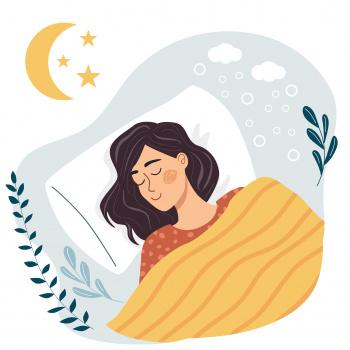Posted by SASTA
on 29/09/2025

Let’s be honest—between classes, assignments, part-time jobs, social life, and endless scrolling, sleep often gets pushed to the bottom of the priority list for secondary students.
But here’s the simple truth: sleep isn’t a luxury, it’s a necessity. We all need it, and prioritising sleep can be an absolute superpower. It’s one of the most powerful tools you have to support your wellbeing, boost your energy, and help you succeed in your studies.
Hi! My name is Associate Professor Amy Reynolds, and I am a clinical epidemiologist and intern psychologist. My research team at Flinders University are passionate about researching, talking about and supporting sleep – particularly in young adults. The young adults I see in our sleep clinic often tell me they wish they had known more about sleep and sleep disorders when they were going through high school so they could have been more aware about their sleep earlier. So, let’s take a quick minute to talk about sleep.
Sleep affects almost every part of your life. When you’re well-rested, your brain can concentrate better on the work you’re doing the day. You can focus more readily, remember things faster, and make smarter decisions. That’s a big deal when you’re trying to absorb new information or ace an exam. On the flip side, poor sleep can leave you feeling foggy, irritable, and unmotivated—making even simple tasks feel overwhelming.
But sleep isn’t just about your brain. It’s also vital for your physical health. Good sleep helps your body recover, strengthens your immune system, and gives you the energy to stay active. If you’re into sports or just trying to stay fit, sleep is your best training partner. Without it, your performance and recovery take a hit. Regularly getting poor sleep can also make it even harder to keep on track with other healthy behaviours, like the foods we choose and the exercise or sports we want to do.
Sleep also plays a huge role in everybody’s emotional wellbeing. It helps regulate your mood, manage stressful situations, and support mental health. In fact, ongoing sleep problems can increase the risk of anxiety and depression. That’s why it’s so important to treat sleep as part of your overall self-care, not something you sacrifice to get more done.
What does struggling with sleep look like or mean? When do I know I need to do something different? Maybe you can’t fall asleep easily, wake up often, or feel tired even after a full night of sleep. Perhaps your body won’t let you fall asleep at the time you’d like to? For other people, perhaps it’s that you’re snoring? Maybe you’re having a hard time working out how to fit enough sleep in with the other activities you’re juggling. If any of this sounds familiar, it’s time to speak up. Talk to someone you trust: a parent, teacher, school counsellor, or healthcare provider. Sleep problems are common, especially during adolescence and young adulthood, but they’re not something you have to deal with alone.
There’s an amazing world out there who are focussed on helping your wellbeing after dark! There are even specialists including trained sleep psychologists who have a special interest in helping you with your sleep. You can check out more about one of the world-leading Sleep Health groups, who are based in Adelaide, at our YouTube channel: https://www.youtube.com/playlist?list=PLJSboi7Yt2OAjH7KmH-1mh4fCpOxneqm0
Let’s talk (a lot more) about sleep. Just like we’ve started talking more openly about mental health, it’s time we talk about sleep health too. You wouldn’t ignore a broken bone or a persistent cough, so don’t ignore poor sleep. There are simple strategies and supports that can make a big difference.
Here are a few tips to get started:
- Stick to a regular sleep schedule—even on weekends.
- Limit screen time before bed—having stressful social interactions before bed can really impact how we get off to sleep.
- Avoid caffeine late in the day—it can stay in your system longer than you think.
- Create a calming bedtime routine—reading, stretching, or listening to music can help.
- Talk about it—if sleep is affecting your mood, energy, or studies, reach out.
Sleep isn’t just about feeling rested—it’s about feeling your best. So next time you’re tempted to pull an all-nighter or binge-watch until 3 a.m., remember: sleep is your secret superpower. Use it wisely.

Bio: Associate Professor Amy Reynolds is a leading sleep health researcher at Flinders University, whose work spans public health, workplace wellbeing, and road safety. In 2024, she was named South Australia’s Young Tall Poppy of the Year for her impactful research and science communication. Her current focus includes improving sleep disorder care for young adults and shift workers, and integrating sleep health into national health and safety strategies.
In this Section
Archive
- March 2026
- February 2026
- January 2026
- December 2025
- November 2025
- October 2025
- September 2025
- August 2025
- July 2025
- June 2025
- May 2025
- April 2025
- March 2025
- February 2025
- January 2025
- December 2024
- November 2024
- October 2024
- September 2024
- August 2024
- July 2024
- June 2024
- May 2024
- April 2024
- March 2024
- February 2024
- December 2023
- November 2023
- October 2023
- September 2023
- July 2023
- June 2023
- May 2023
- April 2023
- March 2023
- February 2023
- January 2023
- December 2022
- November 2022
- October 2022
- August 2022
- July 2022
- June 2022
- May 2022
- April 2022
- March 2022
- February 2022
- January 2022
- December 2021
- November 2021
- October 2021
- September 2021
- August 2021
- July 2021
- June 2021
- May 2021
- April 2021
- March 2021
- February 2021
- January 2021
- December 2020
- November 2020
- October 2020
- September 2020
- August 2020
- July 2020
- June 2020
- May 2020
- April 2020
- October 2018
- September 2018
- August 2018
- July 2018

